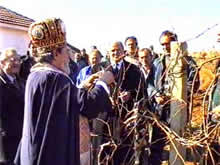|
St. Trifun
  St. Trifun, the saint-protector of vineyards, is broadly celebrated among the Orthodox Christian population. As it falls on 14 February, the same date Valentine’s Day is celebrated in the Catholic world, people are divided as to which holiday to celebrate. Young couples in love tend to exchange candies, flowers, or other gifts, as the older generation tries to preserve the tradition. St. Trifun, the saint-protector of vineyards, is broadly celebrated among the Orthodox Christian population. As it falls on 14 February, the same date Valentine’s Day is celebrated in the Catholic world, people are divided as to which holiday to celebrate. Young couples in love tend to exchange candies, flowers, or other gifts, as the older generation tries to preserve the tradition.
Traditional festivities begin early in the morning, when the men from the village go to the vineyards to do a ritual of “trimming.” They make the sign of the cross, take their pruning knives, and cut three sticks from three main stems. They make the sign of the cross again and pour some wine over the vines.
After this ceremony, they choose “the king of vineyards.” Only then the general feast begins. “The king” is crowned with a wreath of vine sticks and decorated by another garland across his shoulders. He is seated on a cart and vine-growers pull the cart and make their way to the village or town, accompanied by the sounds of bagpipes and drums.
There they stop in front of each house. The respective hostess brings out wine in a white caldron, offers it first to the king to drink and then treats the people of his suite. The wine left in the caldron is thrown over the king, pronouncing a blessing at the same time.
When arriving at his own house, the king changes his clothes and, while still wearing the wreaths on his head and over his shoulders, sits at a long table to meet people from the whole village.
The following two days, known as "Trifunci" in the folklore, are venerated for the protection from wolves. Women do not cut with scissors in order to prevent wolves' mouths from opening, do not knit, and do not sew. They make ritual bread and after serving it to their neighbours, they put morsels of it in the fodder they give to animals -- to protect both cattle and people from wolves.
|